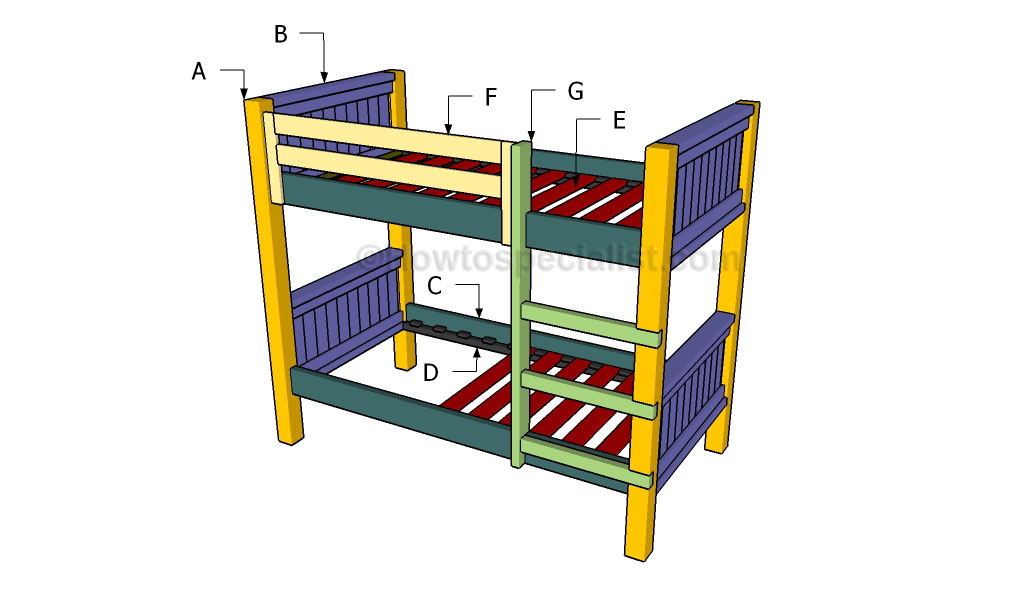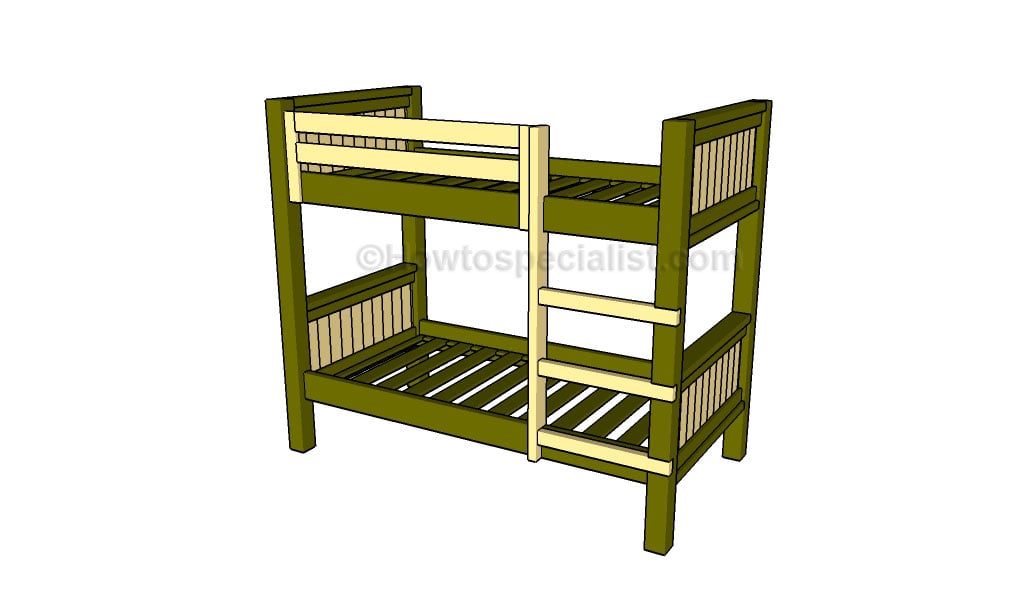This step by step diy article is about how to build a bunk bed. Building a bunk bed is a cheap solution for small rooms that don’t provide enough space for fitting two regular beds. Although there are many designs you could choose from, in this article we will show you all you have t know about making a classic bulk bed out of common materials. If you have worked with lumber before, the carpentry techniques should be familiar to you.
Buy quality lumber, made for building lumber, if you want to get a durable bed. Nevertheless, you could save some money if you purchase lumber with knots, which could even enhance the look of project, giving it a rustic appearance. Select the slats with great attention, checking if they are in a good condition (the lumber has to be straight and without chips, dents or cracks).
Always aligned the components before locking them together with screws. In addition, we recommend you to pre-drill the lumber, otherwise the wood might easily split. Add glue to the joints, if you want to enhance their bond. On the other hand, you could make the headboard and the support slats a little wider than in the plans (about 1 1/2” wider), as a standard 36” wide mattress might not fit inside the frame easily. The rest of the components should be cut the exact same dimensions as in the plans. See all my Premium Plans in the Shop.
Made from this plan
Building a bunk bed
Materials
- A – 4 pieces of 4×4 lumber – 69” long LEGS
- B – 2 pieces of 2×4 lumber – 36 1/2″, 4 pieces of 1×3 lumber – 36 1/2″, 11 pieces of 1×4 lumber – 16″ 4 x HEADBOARD
- C – 4 pieces of 2×6 lumber – 73” long SIDE RAILS
- D – 4 pieces of 2×2 lumber – 73” long, 4 pieces of 1×3 lumber – 1 1/2” long CLEATS
- E – 24 pieces of 1×4 lumber – 37 1/4” or 38 3/4” long SUPPORT SLATS
- F – 2 pieces of 1×3 lumber – 16 1/2” long, 2 pieces of 1×4 lumber – 48″ long GUARD RAILS
- G – 1 piece of 2×4 lumber – 56” long, 3 pieces of 2×3 lumber – 22” LADDER
- 2 pieces of 4×4 lumber – 12 ft
- 5 pieces of 2×4 lumber – 8 ft
- 9 pieces of 1×3 lumber – 8 ft
- 21 pieces of 1×4 lumber – 8 ft
- 2 pieces of 2×2 lumber – 12 ft
- 1 piece of 2×3 lumber – 8 ft
- mattress
- 1 1/4″ screws
- 2 1/2″ screws
- 1 1/4″ brad nails
- glue, stain
Tools
- Safety gloves, glasses
- Miter saw, jigsaw
- Chalk line, tape measure, spirit level, carpentry pencil
- Drill machinery and drill bits
Tips
- Pre-drill holes in the wooden components, before driving in the screws
- Smooth the exposed edges, by using a router with a 1/4” bit
Time
- One day
Related
How to build a bunk bed
First of all, you need to build the four headboards for the bunk bed, using the information from the diy woodworking article. A good compromise between quality and costs would be to use 2×4 lumber for the top and bottom components, making sure the slats are in a good condition. Apply glue to the trims and lock them to the legs with C-clamps.
In addition, we recommend you to drill pilot holes trough the legs and to insert 2 1/2” screws into the top and bottom components, as to increase the bond of the joints.
The next step of the woodworking project is to attach the headboards, between the legs of the bed. As you should notice in the image, you need to drill pocket holes trough the headboards and secure them to the legs with 2 1/2″ galvanized screws. Check if the corners are right-angled before inserting the screws, to get a professional result.
In order to add character to your bed, you could round the exposed edges, using a router. Sand the cut edges, before locking the component into place. You need to cut out notches in the right back leg of the bunk bed, as you will need to attach the ladder into place. Make several parallel cuts inside the marked areas and clean the recess with a chisel and sandpaper.
After building the front and back faces of the bunk bed, we recommend you to fit the side rails, as in the image. In order to get a professional result, you need another person to give you a hand. Align the wooden rails at both ends and make sure the corners are right-angled, before drilling the pocket holes at both ends and inserting the 2 1/2” wood screws.
Continue the project by making the cleats for the bunk beds. First, you need to use the 2×2 cleats to the side rails. Afterwards, attach small pieces of 1×3 to the cleats, as in the image. Leave about 4” between the wood blocks, otherwise the 1×4 slats might not fit easily into place. Use glue or 1 1/4” screws to lock the pieces to the cleats.
Secure the cleats to both sides of the rails, by using 2 1/2″ screws. Use a spirit level to make sure the cleats are perfectly horizontal. Fit the 1×4 slats into place, making sure they create a horizontal and plane surface. You don’t need to secure them to the cleats with screws, as they will be locked into place by the supports.
Afterwards, you need to get the job done by installing the ladder and the guard rails. Therefore, you should start with building the main components of the ladder: the left rail.
Plumb the side rail and secure it to the frame of the bunk bed with 3” wood screws. Afterwards, you need to install the ladder rungs, made out of 2×3 lumber. Drill pilot holes trough the left rails and drive in 3” screws into the rungs. In addition, secure them to the legs with 3” wood screws.
Moreover, fit the guard rails (2×4 lumber) between the pieces of wood on the left side, level them with a spirit level and drive in the screws.
Build the side rails for the top bed and fit them into place, as shown in the plans. Work with attention and make sure the joints are tight, otherwise the end result won’t suit your needs. Add waterproof glue to the joints, in order to get the job done in a professional manner.
Last but not least, you need to take care of the final touches. Therefore, you need fill all the holes with a good filler and let the compound to dry out properly, before sanding the wooden surface with 120-grit sandpaper.
Thank you for reading our article about how to build a bunk bed and we recommend you to check out the rest of our home improvement projects. Don’t forget to share this projects to your friends, using the social media widgets, if you’ve found it useful.










